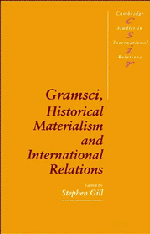Book contents
- Frontmatter
- Contents
- Notes on contributors
- Acknowledgements
- Gramsci and global politics: towards a post-hegemonic research agenda
- PART I PHILOSOPHICAL AND THEORETICAL REFLECTIONS
- PART II PAST, PRESENT AND FUTURE
- 5 Gramsci and international relations: a general perspective with examples from recent US policy toward the Third World
- 6 The three hegemonies of historical capitalism
- 7 The hegemonic transition in East Asia: a historical perspective
- 8 Intemationalisation and democratisation: Southern Europe, Latin America and the world economic Crisis
- 9 Soviet socialism and passive revolution
- 10 Structural issues of global governance: implications for Europe
- References
- Index
- Titles in the series
5 - Gramsci and international relations: a general perspective with examples from recent US policy toward the Third World
Published online by Cambridge University Press: 10 January 2011
- Frontmatter
- Contents
- Notes on contributors
- Acknowledgements
- Gramsci and global politics: towards a post-hegemonic research agenda
- PART I PHILOSOPHICAL AND THEORETICAL REFLECTIONS
- PART II PAST, PRESENT AND FUTURE
- 5 Gramsci and international relations: a general perspective with examples from recent US policy toward the Third World
- 6 The three hegemonies of historical capitalism
- 7 The hegemonic transition in East Asia: a historical perspective
- 8 Intemationalisation and democratisation: Southern Europe, Latin America and the world economic Crisis
- 9 Soviet socialism and passive revolution
- 10 Structural issues of global governance: implications for Europe
- References
- Index
- Titles in the series
Summary
Gramsci's concepts allow scholars to transcend some of the current debates dividing the field of international relations (IR) while preserving the insights of the major traditions, whether ‘realist’ or ‘idealist’, ‘structural’, or ‘historical’, at the same time that they help us break the habit of reifying the nation-state by turning our attention toward the deeper sources of social continuity and change. This paper discusses these benefits of employing Gramsci's insights and illustrates them with conclusions from a study of American foreign policy toward the Third World in the Reagan and Bush era.
GRAMSCI'S CONCEPTS AND INTERNATIONAL RELATIONS
The field of international relations studies the consolidation of power over large populations and territories in a world of multiple, territorially separate, power centres. Gramsci's concern in his investigations of ‘hegemony’ and the broader notion of ‘supremacy’ was also to understand the dynamics of the consolidation of power, including those dynamics in international relations. Thus, in his commentary on the history of modern Italy, Gramsci is able to treat both the Renaissance state system and politics within the twentieth-century state within the same framework and with the same concepts.
We see Gramsci's sociology of power as beginning with the distinction between rule by ‘force’ and rule through ‘consensus’, borrowed from Machiavelli.
- Type
- Chapter
- Information
- Gramsci, Historical Materialism and International Relations , pp. 127 - 147Publisher: Cambridge University PressPrint publication year: 1993
- 21
- Cited by



